Rachel Held Evans's Blog, page 41
May 11, 2013
Saturday Superlatives 5/11/13

I’ll be busy tomorrow hanging out with the folks at GracePointe Church in Nashville, so superlatives are early this week.
Around the Web…Funniest:
“16 Reasons You Should Never Reenact Pinterest Photos”
[#16 nearly made me spit out my coffee yesterday morning]
Wisest:
Jen Hatmaker at Deeper Story with “Wherever It Rises”
"May I, too, celebrate the gospel wherever it rises. None of us will get all this right; better to herald the common places and extend the benefit of the doubt. God’s fingerprint is everywhere; none of us own the rights to His endorsement. If a believer on the opposite end of the ideological spectrum says something good and true, may I say without hesitation, “Amen.” I’m often afraid to identify with certain people lest I be labeled with their brand, but that is foolishness. The gospel is always beautiful, and I am not in singular possession of its power. That is so arrogant. May I bend my knee to Jesus wherever and in whomever He reigns."
Best Writing:
John Blase at Deeper Story with “Therefore”
“Now you may have buttered Mufasa’s circle of life and swallowed it whole, but from the porch I’m sitting on death is against the grain. I don’t like it. Clods are washed away from the main and we’re left here diminished. Triste. Sad. It is now acceptable in the Church to say I’m a believer but I doubt. I’m thankful for this, although it does reveal a bit of historical amnesia. But I’m still grateful for the reality. Maybe one of these days in the Church it’ll be acceptable to say I’m a believer but I’m sad. I’m not talking Eeyore-sad, where I’m nothing but a barely moving mass of mope, but more Don Quixote-sad, still itchin’ to fight windmills but faced with a woeful countenance. I find this to be dangerously close to Jesus-sad, snorting like a horse (wept) at the absence of his friend Lazarus. There, that’s what I’m talking about: Man of Sorrows-sad.”
Best Series:
Christena Cleveland with “Listening Well As a Person of Privilege”
“If privileged people want to avoid a mismatch between their good intentions to their behaviors, they must identify both their specific intentions and the specific behaviors that correspond with those intentions. A general attitude in favor of reconciliation won’t necessarily lead to behaviors that reflect that attitude. More specific attitudes like “It’s important to empower the women of color at my church” are needed. And the specific attitudes need to be matched with specific behaviors like developing leadership/mentoring programs that successfully target women of color and addressing cultural biases that discredit diverse leadership styles. In order to accomplish this task, both the privileged and oppressed people must work together to spell out the specific intentions and behaviors that are needed.”
Best Photoblog:
A Week’s Worth of Groceries Around the World
Best Analysis:
Richard Beck with “Elizabeth Smart and the Psychology of the Christian Purity Culture”
“Now what is peculiar about all this is that we use the purity metaphor in an uneven manner. Most sins don't get the purity metaphor. True, generally understood sin is understood to be a purity violation. But particular sins aren't typically viewed as a purity issue. Most sins are framed, metaphorically, as mistakes or errors, as performance failures. Another common metaphor here is sin as a form of stumbling or falling. What is important to note about these metaphors--performance failures and stumbling--is that these metaphors aren't catastrophic in nature. That is, they can be easily rehabilitated. If you make a mistake you try again. If you stumble and fall you get back up. Inherent in the logic of the metaphor is an obvious route to rehabilitation. But not so with the purity metaphor. When the sin is framed as a purity violation the damage that is done is total and unable to be rehabilitated. A purity violation creates a state of irreversible ruin.”
Related: Kristen Howerton with “Shame Based Sex Education: We Can Do Better”
“No woman, ever, is a chewed up piece of gum. No woman is a cup of spit. No woman is a used car or a dirty rag or a used-up piece of duct tape or a plucked rose or a licked cupcake. No matter what she’s done. Didn’t Jesus come to tell us that?”
Most Insightful:
Ed Cyzewski with “The Heretical Meditating Father”
“It is a frightening thing indeed to gamble your authority, theology, and control by encountering a living God who doesn’t have to play by our rules. That encounter with God is where mysticism leads, and it’s rarely a tidy destination.”
Most Powerful:
Hyperbole and a Half with “Depression Part Two”
Best Response:
Rich Cizik at Faith Forward with “‘Burn it all down’ isn’t Christian: A Response to Mark Driscoll”
“It reminds me of the story often told about Martin Luther: When asked, “If Jesus were to return today, what would you do differently?” the finest theologian of his day and founder of the Protestant Reformation responded, “I’d finish planting this tree.” In other words, he regarded the care of creation and effort to continue striving to bring the world closer to the Kingdom to be our biblical duty and best way to prepare for Christ’s return.”
Best Conversation-Starter:
Sarah Arthur at Her.Meneutics with “Are Women Really Saved Through Childbearing?”
“During a panel discussion at my Christian college years ago, one scholar explained that bearing children is God's plan for womanhood, referencing 1 Timothy 2:15—"Women will be saved through childbearing." A graduate student stood up and addressed him tearfully, "I have just learned that I can never have children. Where is there room in your gospel for me?" The panelist paused for a long time. Then he said, in a broken voice, "I don't have a theology for that." There was no resolution, just pain.”
Also, Ellen Painter Dollar responded to that abortion post from last week with some thoughtful remarks and resources in “Progressive Christians Do Care About Abortion: A Response to Rachel Held Evans”
“We need to look more closely at how we frame adoption as one alternative to abortion, being honest about how adoption carries its own challenging complexities, nuances, heartbreak, and hope. We must consider the significant physical and psychological toll that carrying an unwanted pregnancy can take on some women, and that having an abortion can take on others. We must be ruthlessly honest about how our cultural legacies around race, poverty, rape, and disenfranchisement contribute to abortion decisions and policies. We mustrefuse to sit by silently when self-righteous Christians write off women who have unplanned pregnancies as unworthy of our care, as stupid or promiscuous or getting what they deserve or just not our problem. We need to remind our fellow Christians that abortion is far from the only reproductive issueraising serious ethical and theological questions, expanding our discourse to include technologies such as IVF, prenatal testing, and preimplantation genetic diagnosis (PGD) that have vastly increased the number and types of available reproductive choices.”On the Blog…
Most Popular Post:
“Seasons”
“And it’s easy, when I’m in a season of building, to look down my nose at my brothers and sisters who are in a season of tearing down. And it’s easy, when I’m in a season of throwing away, to look down my nose at my brothers and sisters who are in a season of keeping. “
Also, in case you missed it, we built a well!
Most Popular Comment:
In Response to “Elizabeth Smart, Human Trafficking, and Purity Culture,” Laurie wrote:
"I don't think the answer is to encourage teenagers to wait with the promise of, "It will be so beautiful when it's within marriage." And so far, that approach isn't working anyway.
In my own journey, I went from one of those evangelical Christian virgins until my wedding day, to going through a hard divorce, to questioning my spirituality (still on that journey) and redefining how I thought about sex.
The way Christians emphasize sex adds to the thrill factor. They make it dangerous, but thrilling after marriage. I believe that therein lies the problem. The emphasis placed is on the thrill, NOT on the relationship.
Sex is an outgrowth of a relationship. In order to teach the sacredness of sex, first, I think, we need to teach the sacredness of relationship. Even relationship to one's self. Sex isn't so much about the thrill as it is about the connection. And once young people can understand connection, I think the understanding of sex within that connection will follow. This may be a blasphemous thought to many of you here, but I wonder if encouraging the practice of masturbation would help with this. If sex is about connection, then can't masturbation be used as connecting to yourself (and NOT so much as a way to get a 'high' or to do something forbidden)? I would argue that it would help young people learn that idea, if practice was ENCOURAGED with focus NOT on the thrill but on self-connection and self presence? (Which, by the way, isn't easy) I also believe that self connection and being present to yourself doesn't necessarily start with masturbation and definitely doesn't end there. It needs to be a whole life practice; that of learning to relate to yourself. If someone can be connected to themselves, I think it exponentially increases the ability to connect to others."On my nightstand…
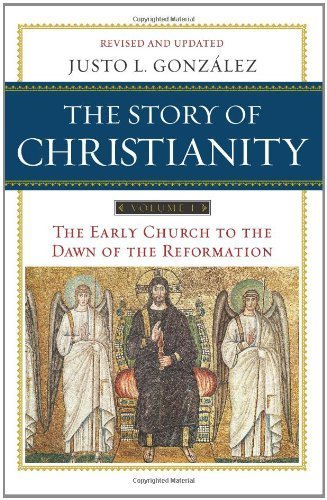
The Story of Christianity, Vol 1: The Early Church to the Reformation
I’m loving this. Prepare for an onslaught of useless historical facts in my blog posts...
###
So, what caught your eye online this week? What's happening on your blog?


May 10, 2013
Wise Words from Pastor Jonathan: A Review of ‘Prototype’
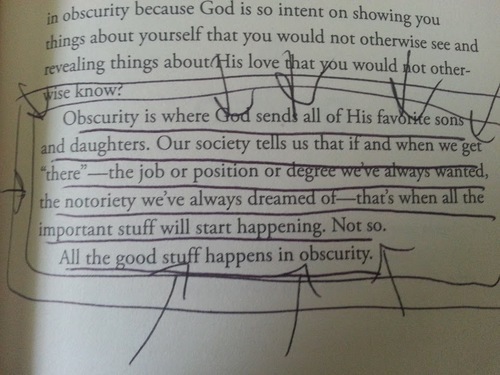
This is what I do to books I like.
I like Jonathan Martin for a lot of reasons: he’s funny; he’s an excellent writer; he celebrates and affirms the equality of women and speaks highly of his wife; he’s humble; he’s whimsical; he’s quick to listen, slow to speak, and slow to become angry.
But one of my favorite qualities about Jonathan is his wisdom.
We got a little taste of this wisdom when we interviewed Jonathan for “Ask a Pentecostal…,” one of my favorite installments in our interview series thus far. And if you follow Jonathan’s blog or listen to his sermons online you will know exactly what I’m talking about.
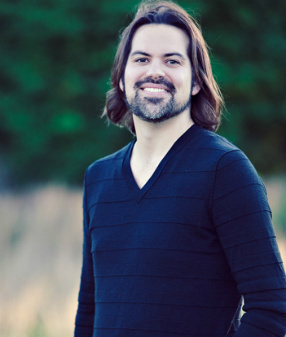
I think of Jonathan as one of my pastors. I have many pastors in my life—from my local pastors here in Dayton, to my “remote” pastors like Nadia Bolz Weber, Brian McLaren, Eugene Peterson, and Greg Boyd who have influenced me through their writing, speaking, and correspondence. They are Lutherans, Catholics, Methodists, Mennonites, Presbyterians, Quakers, and Pentecostals, and I have benefitted from their insights and shepherding in ways too numerous to name.
Well today I am pleased to report that Pastor Jonathan’s wisdom is on fine display in his debut book, Prototype: What Happens When You Discover You’re More Like Jesus Than You Think? In it, Jonathan explores what it means to be God’s beloved and to completely trust, as Jesus did, that God loves us.
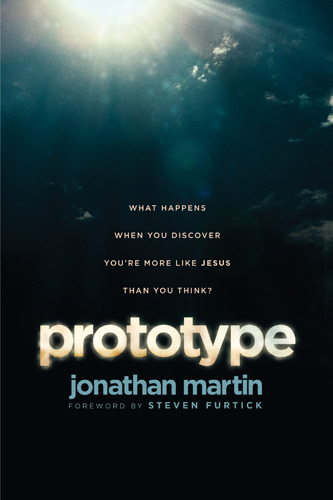
I confess that, even as a fan of Jonathan’s, I was surprised by how much I enjoyed this book. It is rare to encounter a pastor who is as good at writing as he/she is at preaching, but Jonathan is laugh-out-loud funny, thoughtful, well-read (expect quotes from Flannery O’Conner, Henri Nouwen, and Frederick Buechner), appropriately self deprecating (“I know it’s a huge cliché for a thirtysomething pastor to be a massive U2 fan. But I don’t care”), prophetic, and at times startlingly poetic.
A third-generation Pentecostal preacher and the founder of Renovatus: A Church for People Under Renovation in Charlotte, North Carolina, Jonathan has taken the Pentecostal heritage with which he was raised and made it his own in some surprising and inspiring ways. In Prototype, he writes about his childhood, about the South, about identity, calling, and community, about pulling together a ragamuffin group of liars, misfits, and dreamers to form Renovatus, about introducing weekly communion to his community. While the overarching theme of the book is indeed the love of God and the security and freedom we find in it, each chapter really stands on its own with insightful and challenging reflections on ideas like “obscurity,” “resurrection,” and “wounds.” (The chapter on obscurity is worth the price of the book. Really. I’ve read it three times over.)
But as good as the writing is, and as compelling as the stories are, you don’t walk away from Prototype thinking about Jonathan Martin. You walk away from Prototype thinking about your own relationship with God and with the Church. You walk away thinking about the people of Renovatus—Blake, Teddy, and Sally. You walk away thinking about Jesus.
And in a Christian culture bulging at the seams with celebrity pastors who seem as impressed with their own words as the words of Jesus, I can think of no higher compliment.
I underlined paragraph after paragraph in Prototype, and at times found myself wondering how someone from such a different background and with such different life experiences could know exactly what I’m going through, exactly what I hope for, exactly what I worry about, exactly what I fear, exactly what I love. Jonathan is Pentecostal, so there are indeed references to the devil and demons and healing and whatnot, (topics that sometimes make me squirm, I confess), but Jonathan puts a different spin on each. For example, he likens the cacophony of voices competing for our attention in our hyper-connected world to the demon Legion from the New Testament. And the comparison works.
I’ve already quoted from Prototype in a lecture at an event, and I suspect you will see more quotes appearing here on the blog and in future books. So the best I know to do is to share some of my favorite quotes here, in hopes they will encourage you to pick up the book for yourself:
From “Obscurity”:“In our culture of constant access and nonstop media, nothing feels more like a curse from God than time in the wilderness. To be obscure, to be off the beaten path, to be in the wilderness feels like abandonment. It seems more like exile than a vacation. To be so far off of everyone’s radar that the world might forget about us for a while? That’s almost akin to death…[But] far from being punishment, judgment, or a curse, the wilderness is a gift. It’s where we can experience the primal delight of being fully known and delighted in by God.” (p. 50)
***
“Obscurity is where God sends all His favorite sons and daughters. Our society tells us that if and when we get ‘there’—the job or position or degree we’ve always wanted, the notoriety we’ve always dreamed of—that’s when all the important stuff will start happening. Not so. All the good stuff happens in obscurity.” (p. 65)
***
“If you haven’t been riled up about injustice lately, consider this: Around the world right now, every three seconds, an impoverished child is exposed to Nickleback.” (p. 46)From “Wounds”:
“We have always been inclined to worship people or things we perceive as being great. So we exaggerate our own greatness, inflate our successes, downplay our weaknesses, and hide our scars. Thus human history is largely the story of people who say, ‘My god can beat up your god, my king can beat up your king, my army is more awesome than your army,’ and then attempt to prove the point to each other. All in the name of greatness….So what do we make of a God who is worshipped not for His might but for His weakness, even for His wounds? Not a human wearing the medals of military conquest to convince us He is a god, but a God who wears His suffering on His sleeve to convince us He is human? Instead of ‘my god can beat up your god, my king can beat up your king,’ Jesus’ path to kingship comes wrapped in a very odd strategy indeed: He is the King of kings largely because He lets himself get beat up. He is victorious not despite his scars but because of them…By allowing His own life to be taken, Jesus exposed the pitiful ‘power’ of the bullies and disarmed it.” (p. 92-93, 95)
***
“Because John’s apocalypse uses war imagery, people often mistakenly assume that somehow the victory of God was incomplete on the cross, that the real victory comes when Jesus arrives with a sword and finally fights fire with fire, finally overcomes force with even greater force. But a careful reading shows that this is far from the case. For example, when Jesus comes riding in on a white horse with a sword, wearing a robe dipped in blood, it is not the blood of his opponents—it’s His own. There is no battle scene, because Jesus has already defeated the powers (and all the bullies) through His sacrifice on the cross.” (p. 97)
***
When responding to the pain of others: “Sometimes, the sacred thing, the wise thing, the compassionate thing, the best thing, the anointed thing is simply to shut up. I learned a long time ago that there are some things in life so dark that if an answer is asked for, the only reply we are able to give is our tears or our presence. Sometimes the best response is in the courage and wisdom to say, ‘I don’t know,’ but then don’t walk away. Some questions are not opportunities; they’re temptations—to play God, to play the expert, to play doctor, to build a platform or reputation. If there is anything that would scare me, it would be to utter words in a scenario where God Himself would not speak.” (p. 103)
I’ve been quietly mulling over these words since I first read them in Prototype, and am so very grateful for the wisdom of Pastor Jonathan. I hope you will learn as much from him as I have.
Get your own copy of Prototype here. Find Jonathan's blog here.
Also, be sure to check out our interview with Jonathan for "Ask a Pentecostal…"



May 9, 2013
We built a well!

As you may remember, back in 2011, we held our Rally to Restore Unity—a little online celebration of Christian civility, complete with posters, photos, a synchroblog, guest posts, and a fundraiser for Charity Water.
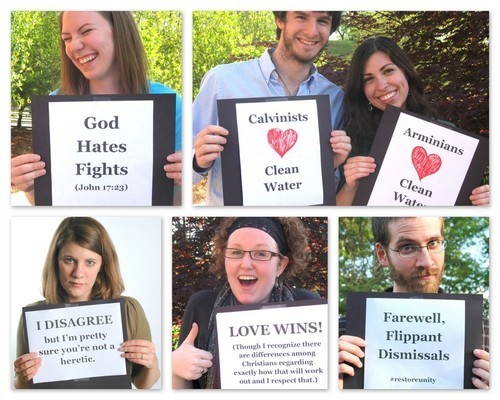
You made some pretty awesome signs:
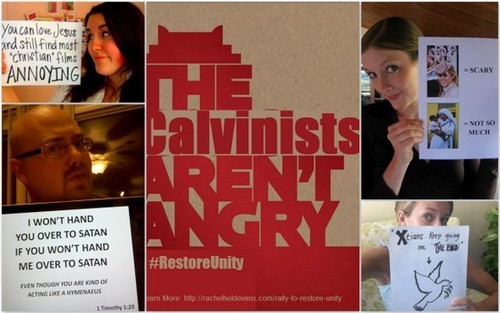
Between the rally and my birthday, we raised $5,000, enough money to help fund a major water project for Charity:Water. And this week, I received notification from Charity:Water that our project has finally been completed!
It’s a drilled well, located in Machelot village in northern Ethiopia. (You can actually check out the GPS coordinates here.)
The well serves about 500 people who have been trained by Charity:Water’s local partners in safe hygiene practices and basic maintenance of the well. Each family using the new water source contributed toward their project's construction and will continue to pay a small amount to use the water; the community will save this money for any necessary maintenance and repairs.

According to our contact at Charity:Water, “The people here, especially women and children, used to walk up to two hours to collect water for their families. Even then, each family member had to make do with about five liters of water per day for drinking, bathing, cooking and everything else. The water wasn't safe to drink and often made people sick. Thanks to your help, people here are walking significantly less every day to collect water. This means each family now can use up to 15 liters per person per day! Most importantly, the water they bring home each day is safe enough to drink.”

Members of the community decided to build the fence and door to prevent animals from contaminating the area.
Diseases from unsafe water and lack of basic sanitation kill more people every year than all forms of violence, including war. Children are especially vulnerable, as their bodies aren't strong enough to fight diarrhea, dysentery and other illnesses. In Africa alone, people spend 40 billion hours every year walking for water. Women and children usually bear the burden of water collection, walking miles to the nearest source, which is unprotected and likely contaminated. Time spent walking and resulting diseases keep them from school, work and taking care of their families. Along their long walk, they're subjected to a greater risk of harassment and sexual assault. With safe water nearby, women are free to pursue new opportunities and improve their families’ lives.
You can learn more about the community at Machelot here, and more about how Charity: Water turns a fundraising campaign into a completed water project here.
I cannot thank you enough for your donations, which ranged from $5 to $500. It’s such an honor to be part of this community, which has connected with another community, many miles away.
As we think of the women and children in these pictures, and all the ways in which this water will nourish and cool and cook and clean in their community, two prayers from Jan Richardson (In the Sanctuary of Women) come to mind. I hope you will pray them with me sometime today:
When you come
to the depth of your thirst—
Its dryness, its dust;
when you arrive at the far reaches
of a desert within,
may the God of the wilderness
bring forth a well;
may you open wide to the drenching
of the water of life.
***
From every hardship, let there come honey.
From every struggle, sweet.
Let angels. Let manna.
Let wellsprings. Let rest.
To the hungry, let food.
To the thirsty, let drink.
Clothes to the naked, care to the sick.
To the stranger, let welcome.
To the prisoner, let company.
Let honey. Let honey. Let honey.
Learn more about Charity:Water.



May 8, 2013
"God does not 'love' us without liking us..."
From Dallas Willard:
“We must understand that God does not 'love' us without liking us - through gritted teeth - as 'Christian' love is sometimes thought to do. Rather, out of the eternal freshness of his perpetually self-renewed being, the heavenly Father cherishes the earth and each human being upon it. The fondness, the endearment, the unstintingly affectionate regard of God toward all his creatures is the natural outflow of what he is to the core - which we vainly try to capture with our tired but indispensable old word 'love'.”
― The Divine Conspiracy: Rediscovering Our Hidden Life In God
Willard died today after losing a battle with cancer. He will be profoundly missed.
Do you have any favorite books, quotes, or memories from Willard you wish to share?


Seasons

When I first started asking questions about my faith, I was terrified. In my loneliness and fear, I tried desperately to drag the people I loved most along with me on my journey through doubt. I was in a season of deconstruction, of uprooting, of tearing down. And like a spoiled child, I ran about the Church, knocking down every theological block tower I could find, delighting in the destruction.
I was asking good questions, worthy questions—about creation, science, biblical interpretation, gender, religious pluralism, heaven and hell— but I was angry with those not asking these questions along with me; I wanted to force them into my season.
But there is a time for everything, and a season for every activity under the heavens.
A time to plant and a time to uproot,
A time to kill and a time to heal,
A time to tear down and a time to build.
Since then, I have come to see that the attentive soul cycles through these seasons. Wintery seasons of deconstruction, uprooting, questioning, and tearing down are often followed by exciting, spring-like seasons of reconstruction, creativity, healing, and building.
A time to mourn and a time to dance,
A time to scatter stones and a time to gather them,
A time to search and a time to give up.
And it’s easy, when I’m in a season of building, to look down my nose at my brothers and sisters who are in a season of tearing down.
And it’s easy, when I’m in a season of throwing away, to look down my nose at my brothers and sisters who are in a season of keeping.
A time to keep and a time to throw away,
A time to tear and a time to mend,
A time to be silent and a time to speak.
Some of us are in seasons of speaking, and some of us are in seasons of silence. Some of us are in seasons of mending, and some of us are in seasons of ripping apart. Some of us are in seasons of mourning, and some of us are in seasons of dancing. Some of us are in seasons of searching, and some of us are in seasons of giving up.
Let’s not forget that we need one another.
We need wildfires for new life to grow. We need scraps for our quilts and jackhammers for our remodels.
We need the sounds of laughter and the sounds of crying. We need baptisms and funerals, confirmations and AA meetings.
We need both the systems and the reforms. We need the theses, the hammer, the nail. And we need the door.
Let’s not forget that we need one another, if only to acknowledge that within every season a new season awaits, swelling and splitting like a seed in the soil, about to break through.
***
So, what kind of season are you living through these days? Do you find yourself struggling to love those in a different season?


May 7, 2013
Ask a recovering alcoholic...(+ a book giveaway)

Our "Ask a..." series continues today with Heather Kopp, a Christian alcoholic in recovery.
Heather is an author, editor, and blogger at HeatherKopp.com. She’s published more than two-dozen non-fiction books. Her recovery memoir, Sober Mercies: How Love Caught Up with a Christian Drunk (Hachette/Jericho) releases TODAY, May 7.
As a long-time Christian, Heather never expected to become an out-of-control alcoholic who kept private stashes of booze all over the place—tucked behind books in her study, zipped into a special compartment in her oversized purse, at the back of her closet stuffed inside her boots.
Even as her writing work and marriage teetered on the brink, she desperately hiding the true extent of her drinking from the rest of the world—her husband included. During the day she wrote about God and prayer and family. At night she’d locked herself in her bathroom to guzzle chardonnay.
For her, as for many Christians who struggle with addiction, overwhelming shame and confusion only made things worse. Why wasn’t her faith enough to save her? Why didn’t repentance, Bible reading and prayer work? Where was God?
Meanwhile, her grown son descended into his own nightmare of drugs and alcohol. She feared for his life, yet she couldn’t stop drinking long enough to help him—or find a way out for herself.
Until the day everything changed.
In Sober Mercies, Heather shares her journey into darkness…and back to the light again. Her story reveals the unique challenges and spiritual conundrums Christians face when they become ensnared in an addiction, and the redemption that’s possible when we finally reach the end of ourselves.
I had the pleasure of reading an advance review copy of Heather's book, and absolutely loved it. I was surprised by how little I knew about alcoholism, particularly how hard it can be for recovering alcoholics to be surrounded by social drinkers who aren't always sensitive to the challenges their friends in recovery face. I found Heather's chapters about her twelve-step group inspiring and challenging, a little picture of what the church is meant to be. Heather's story--honestly and beautifully told--invites us all to the table, baggage in tow, to confront our shared brokenness, our shared hopes, and our shared need for community, forgiveness, and grace.

I wanted to introduce Heather's story to you, and she graciously agreed to be interviewed as part of our "Ask a..." series!
You know the drill. If you have a question for Heather, leave it in the comment section. Be sure to utilize the "like" feature so we can get a sense of what questions are of most interest to you. After 24-hours, I'll pose seven of the most popular questions to Heather and post her responses next week.
In addition, if you leave a question in the comment section, you will automatically be entered to win a free copy of Sober Mercies. Contests will run through the end of the day (May 7) at midnight, EST. I will choose three winners via random.org.
Ask away!
(You can check out every installment of our interview series—which includes “Ask an atheist,” “Ask a nun,” “Ask a pacifist,” “Ask a Calvinist,” “Ask a Muslim,” “Ask a gay Christian,” “Ask a Pentecostal” “Ask an environmentalist,” “Ask a funeral director,” "Ask a Liberation Theologian," "Ask Shane Claiborne," "Ask Jennifer Knapp," and many more— here.)
.



May 6, 2013
Elizabeth Smart, Human Trafficking, and Purity Culture
We’ve spoken in the past about the harmful effects of a shame-based purity culture that treats women (and men) who have had sex before marriage as “damaged goods.”
Many of us who grew up in the Church sat through at least one or two horrific object lessons reinforcing the idea that premarital sex ruins a person for good. Perhaps everyone in the youth group spat into a cup, or perhaps a rose was trampled and torn to pieces, or perhaps a construction-paper heart was ripped to shreds.
Kidnapping survivor Elizabeth Smart recently spoke at a Johns Hopkins University human trafficking forum about her own experience, and said she understood why some victims of trafficking stay with their abusers.
From the Christian Science Monitor:
Smart said she “felt so dirty and so filthy” after she was raped by her captor, and she understands why someone wouldn't run “because of that alone.”
Smart spoke at a Johns Hopkins human trafficking forum, saying she was raised in a religious household and recalled a school teacher who spoke once about abstinence and compared sex to chewing gum.
“I thought, ‘Oh, my gosh, I'm that chewed up piece of gum, nobody re-chews a piece of gum, you throw it away.' And that's how easy it is to feel like you no longer have worth, you no longer have value," Smart said. "Why would it even be worth screaming out? Why would it even make a difference if you are rescued? Your life still has no value."
Obviously, there are many other reasons a victim might stay with his or her abuser, and Elizabeth was certainly not placing the blame for her abduction on the purity culture, but before we dismiss those speaking out against these sort of shaming tactics that have become so prevalent in the Church, we must consider the effects the “damaged goods” narrative can have on young hearts and minds.
I am so grateful to Elizabeth, who has dedicated much of her time to protecting and educating children about violent and sexual crimes through the Elizabeth Smart Foundation and spreading the good word that “ you will always have value and nothing can change that.”
Talk about a woman of valor!
So what’s the alternative? How can we teach young people to value the sacredness of sex and the importance of responsibility without resorting to shame-based, fear-based tactics?



A Letter to LGBT Student Groups (and Allies) at Christian Colleges
I don’t know much about what it’s like to be you, but I figure it can’t be easy.
Many of you face discrimination and double standards. Others are forced to operate “underground.” It must be painful to watch when faculty members who support you face investigations and threats, or when your presence seems to divide the community you love. I know many of you fear expulsion for simply telling the truth, and I suspect that as your high school classmates beam out “It Gets Better” videos from their state school dorm rooms, you can’t help but wonder sometimes when things will get better for you.
I’m sorry for the way you have been treated. It’s unfair, and it’s wrong.
I also know that in some cases, your groups are thriving…which can be both thrilling and terrifying. There are growing pains involved, and those of you in leadership know that growth too can be hard. You are making mistakes, I am sure—perhaps pushing too hard in one situation, or not hard enough in another. You are wondering when it’s right to raise hell and when it’s right to hold back. You are navigating some tricky territory, speaking the truth in love while trying to figure out the truth yourself. You probably feel exposed sometimes, overwhelmed sometimes, alone sometimes.
But you are not alone.
And I want you to know that I’ve got your back.
I fully support your desire to fellowship, to wrestle, to debate, to discuss, to pray, to cry, and to worship together publicly, out of the shadows of secrecy and into the light of truth. Where two or three are gathered in the name of Jesus, the presence of Jesus is there…no matter what anyone else says, no matter whether you are officially recognized as a group.
I want you to know that I pray for you. Often.
I pray that if you lack wisdom, you will seek it in the God who “gives generously to all without finding fault.”
I pray you will find those friends, those professors, and those quiet places on campus that make you feel safe and at home.
I pray you will come to know Jesus better, even when he seems so far ahead you’re not sure you can follow any longer.
I pray you will learn to love yourself and take care of yourself—resting when you need to, laughing when you need to, STUDYING when you need to (!), saying “no” when you need to, crying when you need to, speaking up when you need to, and listening to the wise counsel of others when you need to.
I pray you find a community of faith that gives you room to stretch and grow and screw up and start over.
I pray for you. Often.
But most of all, I want you to know that your love for a Church that doesn’t always love you back astounds me.
It challenges and inspires me.
It moves me to push past my own petty grievances against the Bride and just show up—even when it’s hard, even when it’s not all figured out.
I want you to know that I look up to you.
I have seen in you the sort of faithfulness, persistence, honesty, forgiveness, and patience I long for in my own life. May I wrestle through my own questions of identity with the same integrity and courage as you do. May my love for those with whom I disagree be as remarkable as yours.
I don’t know much about what it’s like to be you. But I value those times we’ve spent talking over coffee and exchanging emails. We always seem to find one another when I’m on a college campus, and I’m beginning to think it’s because we’re the same kind of people—broken, wrestling, hopeful, brave…ragamuffins and misfits just taking it one day at a time.
I love you, and I am honored to be your sister in Christ.
Hang in there.
I’ve got your back.
- Rachel



May 5, 2013
Sunday Superlatives 5/5/13 (plus, I’ll see you in Nashville on Mother’s Day!)
Best Book Club:
It’s such a rare pleasure to spend time chatting, eating, drinking, and laughing with readers who are working through one of my books together. But I did just that in Seattle last week with Olivia Lenz, Lynn Russell, DeHeavalyn D. Pullium, Stephanie Rubesh, Hannah McMillen, Kali Wagner, Liza González, Sarah Kyle, Danni Reaves and Samantha Fisher—Seattle Pacific University grads who are working through A Year of Biblical Womanhood. Let me tell you, these are some TRUE women of valor. Learned so much from them! (Also stayed up WAY too late and ate WAY too much food.) I hope they make good on their plans to start a blog together, because it will be awesome. (Olivia is, for real, a rocket scientist ballerina.)
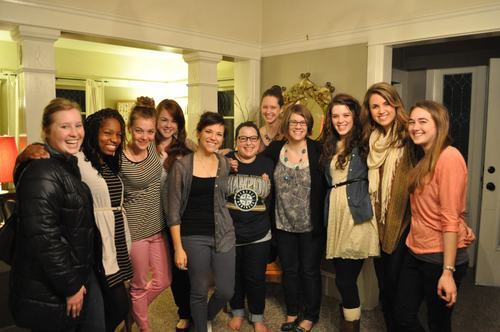
Best Husband in the Whole World:
Dan Evans, who surprised me by taking care of two weeks worth of meals through Person Chef To Go! We’ve never done this before, and just got our first meal today, so we’ll let you know how we like it.
Coming Up:
I’m headed to Nashville! First, I’ll be a guest on Nashville's Super Talk 99.7 WTN, Open Table LIVE, Sunday morning (May 12) from 7-9am. The show is hosted by my friends Matthew Paul Turner and Pastor Stan Mitchell. Should be fun! Next, I’ll be giving the Mother’s Day sermon at Grace Pointe Church in Franklin (522 Franklin Road, Franklin, TN 37069.) Services are at 9 a.m. and 10:45 a.m. Feel free to stop by and say hello!
Speaking of Mother's Day, A Year of Biblical Womanhood is 40 percent off at both Amazon and Barnes & Noble this week. (Hint, Hint.)
Around the Web…Best Video:
“Baby Duck Can’t Stay Awake”
Best Headline:
Donald Trump’s Hair Discovered Crawling in Amazon
Best List:
Beth Woolsey (and her readers) with “20 Things Every Parent Should Hear”
“Look for joy. You’ll find it in the middle of the busy. Or under the ridiculous. Or hanging from the overwhelmed in its underpants. Joy’s like that. It’s in the middle of everything. It’s completely unpredictable. And it will surprise you when you’re not expecting it. Like vomit and diarrhea, except good.”
Best Reflection:
Jonathan Martin with “Feeling at Home in My Smallness”
“But because I am so prone to buy into my own little act, I need the gift of mountains and sea to protest my disproportionate sense of scale, to make me feel smaller and less necessary. Like Job, I need to be reminded of mountain goats and sea monsters to help me get my place in the cosmos. There is so much weight assigned to us to be special, to be unique, to distinguish ourselves. There is a great deal of pressure to be “great.” But what if, today, I want to enjoy my status as my Father’s awkward, backward son, absurdly treasured and irrationally loved?”
Best Analysis:
Daniel Kirk with “Does Paul’s Christ Require a Historical Adam?”
“…What is a ‘given’ for Paul is the saving event of Jesus’ death and resurrection. The other things he says, especially about sin, the Law, and eschatology, are reinterpretations that grow from the fundamental reality of the Christ event. Recognizing this relieves the pressure that sometimes builds up around a historical Adam. Contrary to the fears expressed by Douglas Farrow, we can now recognize that Adam is not the foundation on which the system of Christian faith and life is built, such that removing him means that the whole edifice comes crashing down. Instead, the Adam of the past is one spire in a large edifice whose foundation is Christ. The gospel need not be compromised if we find ourselves having to part ways with Paul’s assumption that there is a historical Adam, because we share Paul’s fundamental conviction that the crucified Messiah is the resurrected Lord over all.”
Best Sentence:
Emily Maynard (at Kelley Nikondeha’s place) with “Only a wildly free God could be that funny.”
Best Paragraph:
Aaron J. Smith in “When I say I’m a feminist” -
“When I say I am a feminist, I am saying I want to listen. The women in my life have their own conflicts, their own struggles, their own victories, and their own defeats. The narrative of their life as a human belongs to them. I want to hear their stories, their wisdom, their fear, their pain. It is not my story to steal and turn into something else. If I believe women can and should speak up on any and every topic they choose, then I must listen when they speak.”
Best Response:
Justin Lee responds to a question about those hyper-sexual gay pride parades
“But it’s important to recognize that when you turn on the news and see a guy in a thong simulating sex acts in a pride parade, he’s not representing the entire gay community. In fact, he’s in the minority. I know lots of gay people, and as far as I’m aware, I don’t know anyone who has ever danced in a thong in a Pride parade.”
Wisest:
Tim Kreider with “The Power of ‘I Don’t Know’”
“My least favorite parts of my own writing, the ones that make me cringe to reread, are the parts where I catch myself trying to smush the unwieldy mess of real life into some neatly-shaped conclusion, the sort of thesis statement you were obliged to tack on to essays in high school or the Joycean epiphanies that are de rigueur in apprentice fiction — whenever, in other words, I try to sound like I know what I’m talking about. Real life, in my experience, is not rife with epiphanies, let alone lessons; what little we learn tends to come exactly too late, gets contradicted by the next blunder, or is immediately forgotten and has to be learned all over again. More and more, the only things that seem to me worth writing about are the ones I don’t understand.”
Coolest:
Poor Carpenter Builds An Incredible Treehouse In The Wilds Of Canada
Truest (nominated by Hannah):
Kimberly Pendleton Bolles with “A Book of Uncommon Prayer: On Losing”
“She looked at them and said, 'The God I believe in knows what it feels like to lose a child.’"
Most Thought-Provoking:
T.F. Charlton at Religion Dispatches with “Why Jason Collins’ Faith is Ignored…and Tebow’s Isn’t”
“This is the world as many on the religious right see it: not one in which Tebow is famous precisely because he’s a mediocre white quarterback who is vocal about his faith, nor one in which Collins and other black athletes who are also “avowed Christians” routinely get passed over by the media and the public—and certainly not one in which gay, lesbian, and bisexual people face systemic discrimination. Instead, they live in a world where Tebow, who according to Barna has a 73% favorability rating with the American public when it comes to his discussion of religion, is being vaguely persecuted for being a straight, white, Christian conservative man.”
Most Relatable:
More Beans with “17 Problems You Haven’t Had Since the 90s”
“What if her mom or dad answers first?”
Most Surprising:
Paul Miller at The Verge with “I’m still here: back online after a year without the internet”
“What I do know is that I can't blame the internet, or any circumstance, for my problems. I have many of the same priorities I had before I left the internet: family, friends, work, learning. And I have no guarantee I'll stick with them when I get back on the internet — I probably won't, to be honest. But at least I'll know that it's not the internet's fault. I'll know who's responsible, and who can fix it.”
Most Exciting:
One Voice for Change: a movement seeking gender equality in Churches of Christ
Most Encouraging:
Helen Lee with “Yet Another Reason to Love Trader Joe’s”
“As much as I love my local Trader Joe’s, and as much as I appreciate that they clearly value their crew members, a part of me wishes I could see Christian organizations making the news for their extraordinary people practices and for being the trendsetters in this area. As Cavanaugh asks, shouldn’t Christian companies set the example as places where employees are treated well? I believe so, absolutely.”
Most Likely To Make You Proud to Be a Feminist:
Jackson Katz with "Violence & Silence"
Most Likely To Be Shared With a Teacher of Valor:
Jen Hatmaker with “Dear Teachers Everywhere…”
“Teachers, when you instruct our kids that struggle, I know you have, yet again, patiently pulled up a seat next to their desks, 24 other kids still in the room, and kindly helped them toward mastery. I know you modify, adapt, adjust for their success, which takes so much time and energy. Children with emotional or physical challenges, kids with language barriers and personal turmoil, those who struggle to learn and retain, test and succeed, they require so much of you in the midst of your regular responsibilities, and your patient attentiveness cannot possibly be overcelebrated. As a mom whose children blossomed under the weight of your investment, I could throw myself at your feet and weep with gratitude.”
Most Likely To Be Such a Teacher of Valor:
Abby Norman with “On the Eve of Testing”
“The test is not going to tell you about my English as a second language kids. It won’t tell you how their first year in ninth grade was also the first year in the general population of the school. It won’t tell you about the way they work twice as hard as everyone else, complain less, and watch out for each other. It won’t tell you about the poetry they can write if you just give them permission to use five words in their original language. It is beautiful. And the test is not going to tell you about my favorite triumph this year. It won’t tell you about my student on the autistic spectrum who says hi to me in the hallway. It won’t tell you about the way he works in groups voluntarily. It won’t tell you about his peers who accept him for who he is and how he won their hearts by fixing their cell phones. It won’t tell you about the peace of mind his mother now has, because of the work he and his teachers have put in this year. It won’t tell you anything about him or the mountains he has climbed. The test will only tell you that he is proficient in English. There is so much more I need you to know about him and how hard he tries.”
Best Insights:
Peter Enns with “Reading the Old Testament: You Gotta Have Attitude”
“…The gospel forms our basic ‘attitude’ toward the Old Testament–a ‘hermeneutical posture,’ which is that point of view from which we read and by which the Old Testament can be accessed.”
Best Reminder:
Amy at The Messy Middle with “A Non-Mom Speaks About Mother’s Day”
“Fast forward several years to Mother’s Day. A pastor asked all mothers to stand. On my immediate right, my mother stood and on my immediate left, a dear friend stood. I, a woman in her late 30s, sat. I don’t know how others saw me, but I felt dehumanized, gutted as a woman. Real women stood, empty shells sat. I do not normally feel this way. I do not like feeling this way. I want no woman to ever feel this way in church again.”
Best Point:
Nate Pyle with “Why Mark Driscoll’s Theology of SUVs matters”
“To say that when Jesus returns he is simply going to burn it all up (meaning earth and all that is in it) is to disregard a theology of resurrection, restoration, and shalom. At running the risk of sounding combative, Driscoll’s tweet is more infused with Platonic philosophy than Biblical theology.”
Best Conversation-Starter:
Abigail Rine at The Atlantic with "The Pros and Cons of Abandoning the Word 'Feminist"
"Every semester, young women come into my office in tears. Much as I did, they are first becoming conscious of how terribly the world views and treats women. In this vital, fragile stage of life when they are just beginning to craft a self and envision a future, these students are simultaneously bombarded with damaging cultural myths about gender. They feel silenced, unheard, diminished.In moments like these, feminism feels like a gift than I can offer, a word that represents the antidote to what wounds them…"
Best Writing:
Hilary at The Wild Love with "If we were having coffee"
"I spent high school and college being enough which wasn’t enough which was never good or beautiful or sexy or gracious or holy or poised or funny… enough. I did the ache in my closet among my mismatched shoes. I did the late nights skipping dinner, the later night disappointments. I did the look of dismay at myself over a less than perfect grade or comment or conversation. And I say, enough of that. If we were having coffee, you and I, I’d want to tell you that. I want to shore it up in us. I want to wedge it so firmly our ribcages that we walk around singing a freedom-song so loud we can’t catch our breath. Free of the worry that comes with enough. Free of the fear. So gloriously free."
Most Informative:
Scot McKnight with "The Pharisees"
"It’s time to revisit the Pharisees, in part because their story needs to be told so we don’t forget and in part because some like to use the “Pharisee” in ways that concern me. It is a standard procedure to say “Pharisee” and mean “legalist, bigot, hypocrite, or picayune meddler into other people’s religious business.” Look at any dictionary. But this is in and of itself a caricature and stereotype, for no one (I hope) would think that all Pharisees have always been religious bigots. Paul, after all, remained a Pharisee (Acts 23:6). Such language spells danger down the road in ways that might surprise us. Even more, we have tended to download anger or extreme disagreement with others onto this term “Pharisee.” So, when I call someone a Pharisee I do not mean anything nice or even charitable. Which, in and of itself is dangerous because no group (well, there are exceptions) is always wrong and always bad."
Most Thoughtful:
Kristin Lucas with “Transformation, Prophets, and Brueggemann”
“It’s a hard and vulnerable thing, to suddenly see your sin. To be aware of the places in you that are prideful and hateful and bitter and angry. And to know that they are that way because you fundamentally don’t trust God as much as you trust yourself. But in the midst of sure death, the prophets start prophesying. And their message is not one of punishment and condemnation, but one of hope. It was true for Israel, and it is true for me.”On the blog….
Most Popular Post:
Why Progressive Christians Should Care About Abortion
Most Popular Comment:
In response to the above post, Jason wrote:
Rachel, an excellent and well thought out post on a difficult issue. I myself have a checkered past with abortion, and I cannot imagine what it would be like as a woman... I just have no frame of reference.
Experiences come to mind, and what could only be the terror of each woman behind them, each person involved, each life that touched another. In college, I had a girlfriend who had an abortion when she got pregnant by another man while dating me. We broke up because of that... and that was tough, and personal. I'm still conflicted 18+ years later about that situation and my heart still breaks for her and her baby. But after college, abortion became a different issue for me... I was a paramedic in a busy urban 911 system. And I ran 911 call after 911 call. I saw poverty. I saw hopelessness. I saw despair. I dealt with it daily. I twice responded to abortion clinics for failed abortion attempts that endangered the life of the mother. One woman went from my ambulance straight into surgery. I responded hundreds of times to women who were 1 day to 2-weeks post-procedure, for everything from depression and suicide attempts to post-abortion side effects and signs/symptoms.
Twenty years as a Paramedic has taught me that all life is precious, complicated, and worth it. I am pro-choice because I've read the US constitution. I'm pro life because I have delivered babies, held parents in my arms after their stillborn babies have been born, and helped women who have had abortions. I learned quickly that to judge another is to do them the greatest disservice... because you don't have to live with the consequences of their actions.
Love and Crave Justice... Give Endless Grace... Pour out Mercy.... Love Jesus... and Love Others....Thank you for your heartbreaking post that resulted in my trip down memory lane..
###
So, what caught your eye online this week? What’s happening on your blog? And will I see you in Nashville next week?


May 2, 2013
Why Progressive Christians Should Care About Abortion
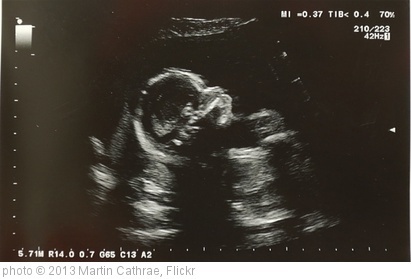
I knew what abortion was before I knew where babies came from.
Growing up in the evangelical subculture of the 80s and 90s, I was well versed in the language of the pro-life cause, as familiar with Roe vs. Wade and the silhouette of a tiny fetus as I was with Disney princesses and contemporary Christian music. My young mind grasped the essence of the pro-life argument—that all of life is valuable, no matter how small or vulnerable—but mistakenly reduced the solution to abortion to a single step—vote for a pro-life president, and abortion will go away. A Republican president meant no more dead babies. It was as simple as that.
…Until it wasn’t.
The first president I voted for was George W. Bush. My dad dropped me off at the polling station and I marched into the Rhea County Courthouse to cast my vote for life. While President Bush endorsed the 2005 Partial Birth Abortion Ban Act, which I supported, he also championed a pre-emptive war in Iraq that costs hundreds of thousands of lives. His presidency did not make much of a dent in the abortion rate, and even though he appointed conservative judges, Roe vs. Wade remained intact. By the time W finished his second term, I had graduated from college, come to terms with the fact that the criminalization of abortion is highly unlikely no matter the party in power, expanded my definition of “pro-life” to include Iraqi children and prisoners of war, and experienced first-hand some of the major problems with America’s healthcare system, which along with poverty and education issues, contributes to the troubling abortion rate in the U.S. I remained pro-life idealistically, but for the first time, voted for a pro-choice president, hoping that the reforms I wanted to see in the healthcare, the economy, immigration, education, and for the socioeconomically disadvantaged would function pragmatically to reduce abortions. A couple of my conservative friends called me a baby killer. Several questioned my salvation.
As I advocated for the election (and re-election) of President Obama, I confess I grew somewhat embarrassed by the pro-life cause. I hated those cars that boasted a “Choose Life” sticker on one bumper and a “You’ll Have to Pry My Gun From My Cold, Dead Hands” on the other. The stubborn commitment to abstinence-only education among many evangelicals struck me as counterproductive to the cause, and those awful statements about how a raped woman has a “way of shutting that whole thing down” to prevent pregnancy were shameful and ignorant. Plus, sometimes it seemed like abortion was the only social justice issue my evangelical friends cared about, so they turned a blind eye to the ways in which Republican politics might hurt other disadvantaged groups, or turned my advocacy on behalf of other causes (like gender equality, trafficking, peace, healthcare reform, gun control, etc.) as an opportunity to make a statement about the horrors of abortion in comparison. It was all picket signs and prayer walks. But I wanted more conversations, and action, around poverty, adoption, and healthcare.
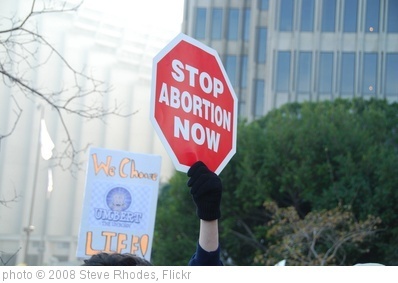
For a lot of pro-lifers, it seemed, abortion was all about the baby.
The woman, and the factors that might contribute to her decision to terminate her pregnancy, didn’t seem to matter much.
But how can we end abortion if we don’t examine why women seek out abortions in the first place? Making it illegal won’t stop it from happening, and yet so many of our efforts are directed toward that end. Aren’t we wasting our time and money by simply throwing it at politicians who wave the pro-life banner, but then do little, practically, to address the underlying issues related to abortion? And why on earth oppose access to birth control and reforms in the health care system when those will likely make the biggest difference in actually curbing abortions in this country?
(For an interesting look at the problem of categorizing the pill as an abortifacient, check out Libby Anne’s piece on the topic, where she notes that “if your goal is to save ‘unborn babies,’ and if you truly believe that a zygote – a fertilized egg – has the same value and worth as you or I – the only responsible thing to do is to put every sexually active woman on the pill,” because the pill actually reduces the number of zygotes naturally rejected by a woman’s body. Also, this month's Christianity Today includes a short article on how the morning-after pill does not inhibit implantation, but rather blocks fertilization.)
Furthermore, as I became more involved in the feminist conversation (some feminists are pro-life, of course, but many are pro-choice), I began to understand some of the arguments against the criminalization of abortion, like that banning abortion does not necessarily reduce the abortion rate, that enforcing a ban on all abortions would be impossible, and that women would likely seek out abortions through unsafe, illegal procedures anyway.
I also began listening to heartbreaking stories—from women like Cecily and Tamara who had to terminated wanted pregnancies for their health.
And when I was honest with myself, I had to admit that I don’t know exactly when life begins (at fertilization? at the first heartbeat? at the existence of brain waves?). Does the Bible, or Christian tradition, really make this abundantly clear? There is even disagreement among Christians about this, (and historically, even among evangelicals), so was it really my place to deny a woman who has been raped, for example, access to a morning-after pill?
And so I remained pro-life in my personal conviction, but I began to question my position that all abortions should be criminalized. I could be against abortion personally, but ambivalent about its legality, right? I could have my own convictions about this issue without making a scene. It was as simple as that.
….Until it wasn’t.
Under President Obama’s presidency, the overall abortion rate has indeed seen a decline, but he overturned some of Bush’s restrictions on late-term abortions, and there are these drones in the sky that don’t seem very pro-life to me. I squirmed on the couch when, during the 2012 Democratic National Convention, cheers erupted upon every mention of a woman’s “right to choose.” A lot of pro-choice folks like to say that “no one is pro-abortion,” but when celebratory concert series and festivals are organized around the anniversary of Roe vs. Wade, I can’t help but question the degree to which we have desynthesized ourselves to the reality that abortion means the termination of, at the very least, a potential life, something that should never be celebrated with balloons and rock concerts.
What frustrates me about the pro-choice movement is the lengths to which advocates go to de-humanize unborn children and sanitize the abortion procedure, reducing life to nothing more than a cluster of cells and the implications of pregnancy to little more than a choice. The word “fetus” is used instead of “child.” Efforts to encourage women to receive counseling prior to an abortion are stubbornly opposed. The argument is framed around the woman’s body exclusively, as if the fetus is inconsequential, and pro-life advocates are characterized as being “against” women’s rights. (Frankly, as a woman, and a feminist, I don’t like people invoking my “rights” to unilaterally support abortion.)
For a lot of pro-choicers, it seems, abortion is all about the woman.
The unborn child, and all the complicated, terrifying, and beautiful things its life represents, don’t seem to matter much.
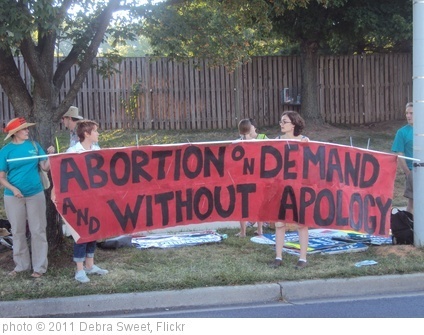
So just as I grew irritated with the pro-life movement for its inconsistency and simplistic solutions, I grew irritated with the pro-choice movement for its callousness and disinterest in discussing the very real ethical concerns surrounding the termination of a pregnancy.
And then the Kermit Gosnell story blew up.
"This case is about a doctor who killed babies and endangered women,” the Grand Jury reported, “What we mean is that he regularly and illegally delivered live, viable babies in the third trimester of pregnancy - and then murdered these newborns by severing their spinal cords with scissors. The medical practice by which he carried out this business was a filthy fraud in which he overdosed his patients with dangerous drugs, spread venereal disease among them with infected instruments, perforated their wombs and bowels - and, on at least two occasions, caused their deaths… Bureaucratic inertia is not exactly news. We understand that. But we think this was something more. We think the reason no one acted is because the women in question were poor and of color, because the victims were infants without identities, and because the subject was the political football of abortion."
In response, pro-life made the (accurate) observation that it is a mere technicality that separates the legal termination of late-term pregnancies from the illegal termination of late-term pregnancies so gruesomely exposed by the photos from Gosnell’s clinic. Pro-choice advocates made the (accurate) observation that Gosnell is being prosecuted precisely because what he did was illegal and warned that, should abortion be criminalized, practices like his would likely flourish. I was pleased to see many pro-life advocates acknowledge that the story highlights the role poverty plays in abortion, admitting that the women in this case were marginalized and vulnerable, and that their needs ought to be talked about more often. I was pleased to see many pro-choice advocates acknowledging that the stark reminder of what happens to a fetus in a late term abortion was rightfully unsettling. (It should be noted that late tern abortions make up a very small percentage of abortions, as do cases of rape and incest…so both sides tend to appeal to rare cases in debates.) Kristen Howerton, among others, had the good sense push past all the pointless rhetoric about a supposed media conspiracy to ask why on earth the state of Pennsylvania didn’t shut this place down sooner.
Here was abortion—in all of its heartbreaking complexity, with all of its ties to life, death, poverty, exploitation, fear, loneliness, politics, and propaganda—sprawled out on the front pages of our newspapers, and no single side “won.” It was an indictment on our shared apathy, on our shared callousness, on our shared simplistic political solutions.“…Because the women in question were poor and of color, because the victims were infants without identities, and because the subject was the political football of abortion."
Not surprisingly, I couldn’t think of anything worthwhile to say. I was, truly, speechless.
My conservative friends took the opportunity to chastise and pester me, convinced my delay in writing a post on the topic revealed my participation in some vast media conspiracy and my unwarranted preoccupation with “minor” issues like gender equality in the church. When I explained on Twitter that a post about abortion isn’t simple enough to fit into 600 words, a guy tweeted back, “Sure it is. I can fit it in three: It’s always wrong.”
Is it?
When the life or health of the mother is at stake?
In the case of rape or incest?
When a woman’s body naturally disposes of a zygote?
Meanwhile, my more liberal friends begged me not to write anything at all. It’s too complicated, they said, too controversial, too complex.
Is it?
When the life of the weaker is taken by the stronger?
When one out of five pregnancies in this country end in abortion?
When places like these fail to get shut down in part because we’ve turned abortion into such a political issue?
I think a lot of progressive Christians like myself, eager to distance ourselves from some of the rhetoric and policies of the Republican brand of the pro-life movement, shy away from talking about abortion, when our call to do justice and love mercy demand that we speak and act to address this issue, even though it may be more complicated than we originally thought.
In fact, I wonder if an appreciation of the nuances in the debate, and of abortion’s connection to traditionally “progressive” issues like poverty and healthcare, may actually make those of us who are “stuck in the middle” especially effective agents of change. Let’s face it: We are unlikely to find a single party that truly represents a “culture of life,” and abortion will probably never be made illegal, so we’ll have to go about it the old fashioned way, working through the diverse channels of the Kingdom to adopt and support responsible adoption, welcome single moms into our homes and churches, reach out to the lonely and disenfranchised, address the socioeconomic issues involved, and engage in some difficult conversations about the many factors that contribute to the abortion rate in this country, (especially birth control). It seems to me that Christians who are more conservative and Christians who are more liberal, Christians who are politically pro-life and Christians who are politically pro-choice, should be able to come together on this and advocate for life in a way that takes seriously the complexities involved and that honors both women and their unborn children.
In other words, instead of focusing all of our efforts on making “supply” illegal, perhaps we should work on decreasing demand. And instead of pretending like this is just an issue of women’s rights, perhaps we should acknowledge the very real and very troubling moral questions surrounding a voluntarily terminated pregnancy.
I am still unsure of exactly how to do this. I don’t even know where to start, really. The more I learn, the more complex this issue becomes. But the Gosnell case does in fact point to something simple: that we are failing to care for the most marginalized and helpless among us, be they unborn children or women whose desperation sent them to Gosnell’s clinic. And we won’t be able to promote a “culture of life” until we are willing to advocate on behalf of both.
Perhaps God has called those of us who feel “stuck in the middle” to do exactly that.
###
What do you think?
How has your thinking on abortion changed and evolved through the years? What was your response to the Gosnell story?
And what sort of PRACTICAL steps can Christians take to to both address the complexities of abortion and actually curb the abortion rate?



Rachel Held Evans's Blog
- Rachel Held Evans's profile
- 1710 followers



